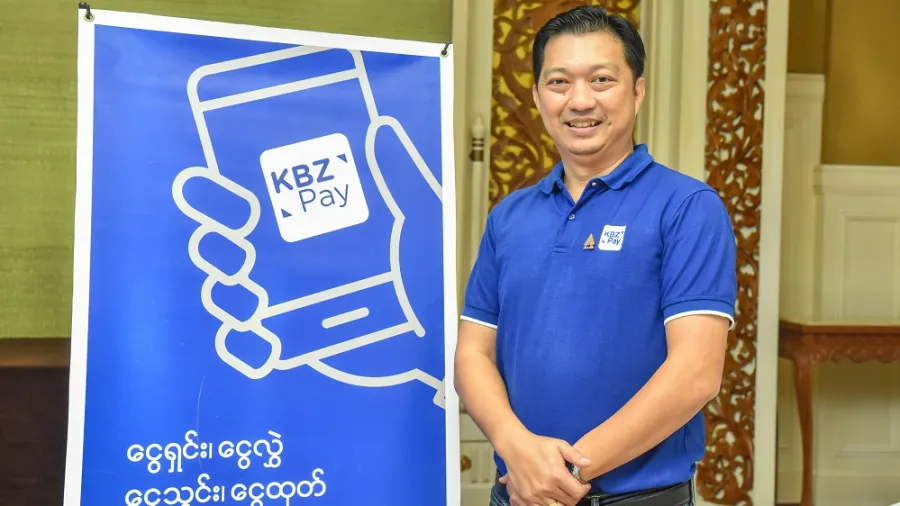
How KBZ Bank strides towards financial inclusion in Myanmar
They launched mobile wallet KBZPay, banking on the country's high smartphone penetration to improve financial connectivity.
With only 10% of Myanmar’s population possessing a bank account but 90 % having a smartphone it made sense for KBZ, the country’s largest private bank, to launch a digital wallet in 2018. Fast forward just a year later and the bank had signed up 3.5 million customers and already processed US$1.8 bn in transactions, and it has further plans for digital inclusion in this market of 70 million people with an economy growing at 6%.
Asian Banking & Finance interviewed Soe Ko Ko, Head of Agent Banking at KBZ Bank, to find out what the bank’s plans are for 2020 with a focus digitalisation and financial connectivity.
The bank is championing 100% financial inclusion in Myanmar despite data showing that roughly 10% of the population is in possession of a bank account. How do you plan to achieve this goal and what programmes do you have in place to support this?
KBZ Bank recognised that whilst only 10% of the population is banked, 90% of people in Myanmar own a smartphone. Even as the bank with the widest branch network, this made it clear that the future of banking is not in building more branches, but in introducing financial services to wider townships and communities through mobile technology.
In October 2018, we launched KBZPay, a mobile wallet that makes purchasing everyday products and managing funds more convenient and secure. With just a smartphone, the app allows customers to carry out everyday transactions that until this point were only provided at a physical branch, such as sending and receiving money from friends and family and paying for bills.
As a heavily cash-based economy, what are the challenges in bringing the whole country under the mantle of the formal financial system? How are you overcoming these challenges and what milestones have you achieved so far? What are your long-term targets?
Bringing the country into the formal financial system starts with encouraging cashless transactions. However, going cashless is a lot of work, both for consumers and for businesses, slowing the adoption of cashless platforms and digital payments. This is especially as cash is still seen as being more convenient for everyday purchases and paying for services.
Digital payments is now working to prove it can be more convenient and trusted than cash. Our aim is simple - make the KBZPay experience better than using cash.
Since the introduction of KBZPay, we have expanded its features from connecting friends, family and communities through peer-to-peer transfers, to now connecting them with the digital economy. We have launched QR code payments at over 230,000 merchants, in-app purchases of airtime top-ups, bus tickets, and mobile gaming tokens, and cardless withdrawals from our network of agents, merchants and ATMs.
With KBZPay, people no longer need to carry huge denominations of cash and travel hours to their nearest retailers to purchase everyday essentials. Our growth attests to how customers are truly seeing the benefits of this. In just its first year of launch, KBZPay has already grown to over 3.5 million users, onboarded with full e-KYC, with transactions topping US$1.8 billion in volume. We are targeting 30 million customers on KBZPay or approximately half the Myanmar population by 2028.
How are you working with the industry and regulators to expand financial inclusion in Myanmar? How would you assess efforts by regulators to support this push and which areas need improvement? Infrastructural gap has been cited as a common problem, with limitations in branches, credit bureau, roads and telephone networks. How are you working your way around this?
Our dream is to achieve 100% financial inclusion in Myanmar. Whilst KBZ Bank is leading the way, this effort needs the collective strength of all in the financial ecosystem to succeed.
The Central Bank of Myanmar has actively promoted the development of modern and equitable financial industry. This includes the creation of the Financial Inclusion Roadmap and leading a digital services working group. KBZ Bank is executing on this same vision with their support in making financial services more accessible to remote communities.
KBZPay is core to this effort as it overcomes the physical and infrastructural limitations, and helps friends, family, and communities connect to one another and the digital economy.
Education is also a key component of financial inclusion. What initiatives do you have in this area?
Absolutely. We recognized that to deepen financial inclusion, mobile technology alone is not enough. In a country where digital infrastructure and financial services are new and unfamiliar to most, these services need to be introduced with digital and financial literacy embedded every step of the way.
To address this, we put in place a radically new approach to banking by turning our 18,000 employees into an on-the-ground force for financial inclusion. We developed sophisticated mapping of customers, merchants, and agents and tasked our branch teams with onboarding them to the KBZPay network in all townships and wider communities.
With this unique approach, our staff have the critical opportunity to meet with customers, merchants, and small businesses face-to-face. We guide them through KYC processes and navigating the app to ensure millions in Myanmar are comfortable and well-equipped to use digital financial services safely and securely.
We also educate customers and the wider community on using these services safely through programmes and content. This includes organising a series of financial literacy seminars at over 30 universities across the country. Conducted by the KBZ Bank staff, the education series covers topics on more effective ways to save and protecting digital identity over financial transactions, etc. To date, the seminars has reached more than 10,000 students. This gives the future leaders of our country more confidence and familiarity with digital environments. It equips them with more skills and knowledge, and the ability to understand how it shapes their behavior and opportunities in this digital economy.
The bank’s mobile wallet application, KBZPay, has facilitated one million transactions as of April 2019, a significant milestone for an app that’s barely over a year old
What are the functionalities available in the app and how was it received after its launch? To the extent that you’re able to, can you share figures of adoption and market take-up with us?
KBZPay is Myanmar’s fastest growing mobile wallet, giving millions of people a way to access to everyday financial and digital services at the touch of a finger. With one app, one can: send and receive money to friends and family with the swipe of a finger; make purchases at favourite shops and restaurants through QR Code stickers; withdraw physical cash through our network of agents and cardless ATMs across the country; pay for bills like broadband services, loan repayments, and tuition fees through Quickpay; purchase everyday essentials including airtime top-ups, bus tickets, and gaming tokens; [and] protect yourself with digital life insurance based on the balance of your KBZPay wallet.
This is revolutionary for a country that has an insurance penetration of less than 1%, offering millions in the country access to protection for the first time.
Since the launch in October 2018, KBZPay has grown to over 3.5 million customers and over 230,000 merchants and agents. The app has processed over $1.8 billion in transaction value, a clear signal of strong demand for mobile financial services in the country. With KBZPay’s successful launch, both KBZ Bank’s digital retail customer base has grown by 366% and its digital penetration of our customer base more than doubled from 10% to 28% in 2018.
How can digital tools expand financial inclusion in the country? What are your future plans?
Digital tools help streamline everyday tasks that involve money in a way that is transparent and seamless. It removes the friction that comes from interacting with traditional financial services, particularly the costs involved with using paper-based systems and cash. This encourages more to manage their money within the formal financial system and to better connect with one another and with businesses across the country.
Our aim is to reach 30 million KBZPay customers by 2028 or half the Myanmar population, connecting families, friends, and communities to a modern, mobile-first financial ecosystem that supports their digital lifestyles.
Future plans for KBZPay include: collaboration with more travel and ticket booking platforms ; facilitating E-commerce purchases for online businesses; working with education and e-learning platforms; introducing payroll services for a future-ready workforce; providing an innovative payments platform for start-ups to scale; building a future-proof financial ecosystem with KYC and security embedded every step of the way; and equipping citizens with financial and digital literacy
Through KBZPay, we will continue to drive secure financial connectivity in the country, equipping the nation with world-class skills, tools, and experience to help Myanmar leap to a mobile-first economy.
By Sandra Sendingan and Frances Gagua



















 Advertise
Advertise










